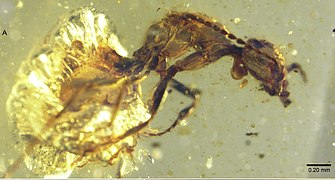Zigrasimeciinae
Appearance
| Zigrasimeciinae Temporal range:
| |
|---|---|

| |
| Zigrasimecia hoelldobleri holotype worker | |
| Scientific classification | |
| Domain: | Eukaryota |
| Kingdom: | Animalia |
| Phylum: | Arthropoda |
| Class: | Insecta |
| Order: | Hymenoptera |
| Family: | Formicidae |
| Subfamily: | †Zigrasimeciinae Borysenko, 2017 |
| Genera | |
|
See text | |
Zigrasimeciinae is a subfamily of ants, known from the Cretaceous period, originally named as the tribe Zigrasimeciini within the subfamily Sphecomyrminae by Borysenko, 2017,[1] it was elevated to full subfamily in 2020. It contains three described genera.[2] They are sometimes known as iron-maiden ants in reference to their densely spiked mouthparts, reminiscent of an iron maiden torture device, that were likely used to trap prey.[3] Boltonimecia canadensis was described from Campanian Canadian amber out of Alberta, Canada, while the species of Protozigrasimecia and Zigrasimecia are both exclusively known from Cenomanian Burmese amber found in Myanmar.[3]
Genera and species
- Boltonimecia Borysenko, 2017?
- B. canadensis (Wilson, 1985)
- Protozigrasimecia Cao et al., 2020
- P. chauli Cao et al., 2020
- Zigrasimecia Barden & Grimaldi, 2013
Zigrasimeciinae species
References
- ^ Borysenko, L.H. (2017). "Description of a new genus of primitive ants from Canadian amber, with the study of relationships between stem- and crown-group ants (Hymenoptera: Formicidae)". Insecta Mundi. 570: 1–57.
- ^ Boudinot, B.; Perrichot, V.; Chaul, J. (2020). "†Camelosphecia gen. nov., lost ant-wasp intermediates from the mid-Cretaceous (Hymenoptera, Formicoidea)". ZooKeys (1005): 21–55. doi:10.3897/zookeys.1005.57629. ISSN 1313-2970. PMC 7762752. PMID 33390754.
- ^ a b Cao, H.; Boudinot, B.; Wang, Z.; Miao, X.; Shih, C.; Ren, D.; Gao, T. (2020). "Two new iron maiden ants from Burmese amber (Hymenoptera: Formicidae:† Zigrasimeciini)". Myrmecological News. 30: 161–173. doi:10.25849/myrmecol.news_030:161.
- ^ a b c d e Chaul, J. C. M. (2023). "A revision of the Cretaceous ant genus Zigrasimecia Barden & Grimaldi, 2013 (Hymenoptera: Formicidae: †Zigrasimeciinae)". Zootaxa. 5325 (3): 301–341. doi:10.11646/zootaxa.5325.3.1.
- ^ Zhuang, Yuhui; Ran, Hao; Li, Xiaoqin; Feng, Chen; Liu, Yu (2022). "A new species of the iron maiden ant based on an alate female from mid-Cretaceous Burmese amber (Hymenoptera: Formicidae: †Zigrasimecia)". Cretaceous Research. 130: 105056. doi:10.1016/j.cretres.2021.105056. S2CID 240812443.




